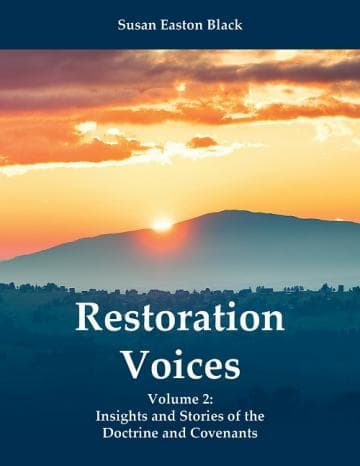Book
140 Chapters

Not long after his own baptism on May 15, 1829, in the Susquehanna River, Oliver Cowdery baptized Samuel Smith, the brother of the Prophet Joseph. When Samuel “returned to his father’s house [in Manchester, New York] greatly glorifying and praising God, being filled with the Holy Spirit,” his brother Hyrum was very interested in what Samuel had to say. “Not many days afterwards” Hyrum journeyed to Harmony, Pennsylvania, to speak with his brother Joseph and Oliver Cowdery and learn more from them about the coming forth of the Book of Mormon and baptism.[1] Hyrum was also concerned about his standing before the Lord.
The Prophet Joseph petitioned the Lord in behalf of Hyrum and received a revelation through the Urim and Thummim. The words of that revelation are contained in Doctrine and Covenants section 11:
Behold, the field is white, already to harvest; therefore, whoso desireth to reap let him thrust in his sickle with his might, and reap while the day lasts, that he may treasure up for his soul everlasting salvation in the kingdom of God. Yea, whosoever will thrust in this sickle and reap, the same is called of God. Therefore, if you will ask of me you shall receive; if you will knock it shall be opened unto you (D&C 11:3–5).
The revelation also instructed Hyrum to keep the Lord’s commandments and spend his days establishing the cause of Zion. His promise for so doing was that “the mysteries of God shall be unfolded unto you, and then shall you be made rich. Behold, he that hath eternal life is rich. Verily, verily, I say unto you, even as you desire of me so it shall be done unto you; and, if you desire, you shall be the means of doing much good in this generation” (D&C 11:6–8).
Following what would be the first of fourteen separate instances in which the name of Hyrum Smith appears in the Doctrine and Covenants (D&C 11, 23, 112, 115, 124, and 135), he walked into the Seneca Lake and was there baptized in early June 1829 by his brother Joseph.
When Hyrum returned to Palmyra, he rejoiced not only over his baptism but the birth of his second daughter, born June 27, 1829. A few days following her birth, Hyrum became one of the Eight Witnesses of the Book of Mormon, meaning he was privileged to see, handle, and observe the engravings on the gold plates.
Through successive years, Hyrum became widely recognized not only as the brother of the Prophet Joseph but for his integrity. In a blessing given to him by Joseph, the word integrity is central:
Blessed of the Lord is my brother Hyrum for the integrity of his heart: he shall be girt about with strength, truth and faithfulness shall be the strength of his loins. From generation to generation he shall be a shaft in the hand of his God. . . . His name shall be called a blessing among men. . . . His children shall be many and his posterity numerous, and they shall rise up and call him blessed. And he shall have eternal life.[2]
Of Hyrum, Brigham Young said, “Hyrum was as good a man as ever lived. His integrity was of the highest order. . . . I used to think, and think now, that an angel dwelling in the presence of the Father and the Son possessed no more integrity in their hearts than did Hyrum Smith.”[3] John Taylor concurred and said, “If ever there was an exemplary, honest and virtuous man, the embodiment of all that is noble in the human form, Hyrum Smith was the representative.”[4]
[1] History, 1838–1856, volume A-1 [23 December 1805–30 August 1834], 19.
[2] “Blessings by Joseph Smith Jr. dated December 18, 1833, in H. Michael Marquardt, comp, Early Patriarchal Blessings of The Church of Jesus Christ of Latter-day Saints (The Smith-Pettit Foundation, 2007), 6.
[3] Address given by Brigham Young, Salt Lake City Bowery, October 8, 1866, as cited in M. Russell Ballard, “Brothers Bound by Love and Faith,” Satellite Broadcast, Carthage, Illinois, June 26, 1994.
[4] Edward H. Anderson, “The Prophet and Patriarch,” Improvement Era 14 (August 1911): 860.
Book
140 Chapters
Items in the BMC Archive are made publicly available for non-commercial, private use. Inclusion within the BMC Archive does not imply endorsement. Items do not represent the official views of The Church of Jesus Christ of Latter-day Saints or of Book of Mormon Central.